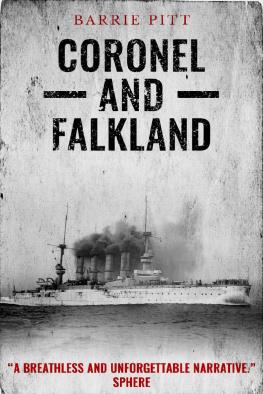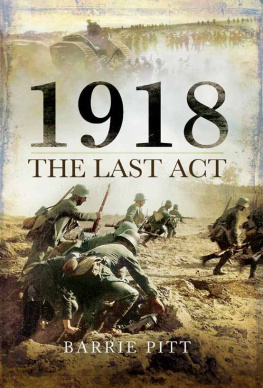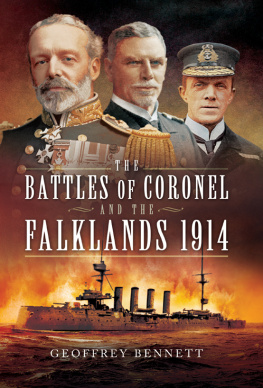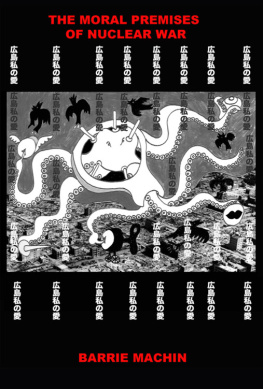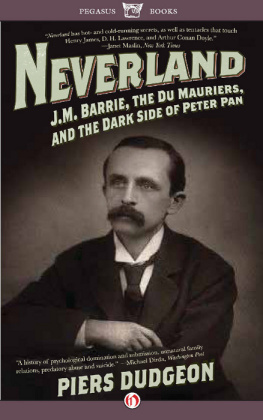Barrie Pitt - Coronel and Falkland
Here you can read online Barrie Pitt - Coronel and Falkland full text of the book (entire story) in english for free. Download pdf and epub, get meaning, cover and reviews about this ebook. year: 2018, publisher: Sharpe Books, genre: Adventure. Description of the work, (preface) as well as reviews are available. Best literature library LitArk.com created for fans of good reading and offers a wide selection of genres:
Romance novel
Science fiction
Adventure
Detective
Science
History
Home and family
Prose
Art
Politics
Computer
Non-fiction
Religion
Business
Children
Humor
Choose a favorite category and find really read worthwhile books. Enjoy immersion in the world of imagination, feel the emotions of the characters or learn something new for yourself, make an fascinating discovery.
- Book:Coronel and Falkland
- Author:
- Publisher:Sharpe Books
- Genre:
- Year:2018
- Rating:4 / 5
- Favourites:Add to favourites
- Your mark:
- 80
- 1
- 2
- 3
- 4
- 5
Coronel and Falkland: summary, description and annotation
We offer to read an annotation, description, summary or preface (depends on what the author of the book "Coronel and Falkland" wrote himself). If you haven't found the necessary information about the book — write in the comments, we will try to find it.
Coronel and Falkland — read online for free the complete book (whole text) full work
Below is the text of the book, divided by pages. System saving the place of the last page read, allows you to conveniently read the book "Coronel and Falkland" online for free, without having to search again every time where you left off. Put a bookmark, and you can go to the page where you finished reading at any time.
Font size:
Interval:
Bookmark:
Coronel and Falkland
Barrie Pitt
Sharpe Books
Should you be interested in hearing about more news and info on special offers from Sharpe Books please visit sharpebooks.com and sign up to our newsletter.
If you are a book blogger or interested in reviewing any of our titles please also get in touch through our website.
Should you be a writer we are also accepting submissions.
Barrie Pitt 1960
Barrie Pitt has asserted his rights under the Copyright, Design and Patents Act, 1988, to be identified as the author of this work.
First published in 1960 by Cassell & Company Limited.
This edition published in 2018 by Sharpe Books.
For
TONI
Table of Contents
AUTHORS NOTE
SUCH a book as this cannot be written without the help and cooperation of a large number of people. Commander M. G. Saunders and Mr H. C. Beaumont of the Admiralty Historical Section have guided me in the use of material from published German sources, and from the numerous survivors of the battles I would like especially to thank Captain T. H. Back and also to mention the late Mr J. R. Warburton, who lent me his private letters and diaries and spared me much of his time time, alas, of which he knew quite well he had little left.
Mr J. W. Stock too, has given me much invaluable advice and the benefit of his knowledge of naval lore and history not to speak of the use I made of his private library in Wiltshire.
To these and many others, I tender my grateful thanks, for they provided much factual material and pointed the way to other sources of information.
But for the opinions expressed in this book, and especially for the reconstruction of events which I believe led Admiral Graf von Spee to attack the Falkland Islands, I alone am responsible. The known facts are few and are restricted to the positions and movements of the East Asiatic Squadron at certain times, the weather conditions and the various signals and instructions which appear in the Appendix. Other interpretations than mine have been placed upon these facts.
One of these other interpretations might encompass the truth and so might this.
BARRIE PITT
ACKNOWLEDGEMENTS
From the abundance of literature covering, or mentioning, the battles of Coronel and the Falkland Islands, I would like to acknowledge particularly my debt to the following:
The Battle Cruisers at the Action of the Falkland Islands ,
Rudolph Verner, John Bale, Sons & Danielsson.
The Battle of the Falkland Islands , H. Spencer-Cooper, Cassell.
Before Jutland , Hans Pochhammer, Jarrolds.
Coronel and After , Lloyd Hirst, Peter Davies.
Coronel and the Falklands , John Irving, A. M. Philpot.
Der Krieg zur Zee , Erich Raeder, E. S. Mittler & Son.
Naval Operations of the Great War , Vol. I, Sir Julian Corbett, Longmans Green.
Naval Review , Vol. VIII, No. I.
Whispers from the Fleet , Sir Christopher Cradock.
The World Crisis , Winston S. Churchill, Thornton Butterworth (Odhams Press).
INTRODUCTION
THE outbreak of war in August 1914 did not catch the Armed Services of the Crown in half the state of anxiety and unpreparedness that many critics would have us believe. The Royal Navy, for instance, despite the limitations imposed by financial and political factors of the early 1900s, was quite capable of carrying out the major portion of its initial duties at any rate in Home Waters and indeed did so with estimable efficiency and speed. Within a matter of days the Grand Fleet had established a control over the northern entrance to the North Sea through which the only enemy surface vessels ever to pass were the occasional solitary (and extremely fortunate) commerce raider; troop convoys crossed the Channel to the battle areas in large numbers and apparently complete safety, the German battle-cruiser Goeben and her consort Breslau in the Mediterranean, if not caught and sunk, were at least chased away from the danger areas and up into the Bosphorus, and from all the rest of the wide seas which covered the globe, the German mercantile and naval flags virtually disappeared.
But not entirely.
In those early years of the century, Germany had many oversea possessions and protectorates, many centres of business interest. Units of the Imperial German Navy therefore kept watch and patrol in waters far from the Fatherland often in close collaboration and friendship with ships of the Royal Navy similarly engaged. There had, for example, been trouble in Mexico that very summer, and to protect European interests the German light cruiser S.M.S. Dresden acted in concert with ships of the British 4th Cruiser Squadron under Rear-Admiral Cradock a collaboration which received a glowing tribute from the German Envoy in Mexico in his letter of appreciation to the British Admiral. As it happened, S.M.S. Dresden was due for relief at the end of July by another light cruiser, S.M.S. Karlsruhe , and so when war was eventually declared on 4 August, and friends of yesterday became bitter antagonists of tomorrow, there were two enemy warships at large somewhere in the Western Atlantic, presumably about to wreak havoc among the Allied or neutral shipping. During the ensuing weeks, these two ships were to prove most elusive.
But it was on the other side of the Americas that the greatest oversea strength of the Imperial German Navy was concentrated. German possessions in the Pacific were many and far-flung. They included the Marianas, the Carolines, the Marshall Islands, Bougainville in the Solomons, German New Guinea and the islands now known as New Ireland and New Britain which lie off that coast, and Samoa. Perhaps most important of all, there was the young and vigorous German colony in the Kiao-chow territory up in the Yellow Sea, grouped about its capital, the naval base of Tsingtao. From this base operated the ships of the German East Asiatic Squadron.
The composition of this squadron was well-known, and so was its reputation. In Whitehall it was recognized as a naval unit of compact strength, excellent morale and high efficiency, officered and led by sailors of character and experience. The information about it which Whitehall lacked, however, was in some ways the most important the location of its principal ships and the intentions of the officer who commanded them all and these vital facts were to remain largely matters of constant and rather harassed speculation in the minds of a number of important people, for the best part of three months.
One of the light cruisers of the squadron Emden did in fact reveal her position much earlier than did the others, for she suddenly appeared in the Bay of Bengal upon a commerce-raiding cruise which paralysed trade in the area, thoroughly frightened business interests from Singapore to Ceylon, and compelled the admiration of all whose pockets, lives or sentiments were not immediately threatened by her activities.
But it was quickly evident that she was operating alone. The other ships of the squadron Scharnhorst , Gneisenau , Nrnberg and Leipzig vanished into the limitless expanse of the Pacific, and although at intervals news would arrive of their sudden appearance at such places as Fanning and Christmas Islands, at Samoa and later off the French port of Papeete at Tahiti, they vanished again long before British or Allied naval forces in the area could concentrate and bring them to action.
Then in the middle of October they arrived at Easter Island, and when the reports reached Whitehall the conclusion hardened that they were heading for South America and the co-operation of the German interests in Chile. This could hardly have come as much of a surprise to the Admiralty, for the alternative courses of action which faced the Commander-in-Chief of the East Asiatic Squadron, once Japan had entered the war on the Allied side, were not very attractive. Whether it was a surprise or not, the fact remained that by the beginning of November an enemy force of considerable strength would be off the west coast of South America, and might shortly afterwards come around the Horn to the east coast. The damage it could then cause among the trade lanes bearing vital supplies of foodstuffs and war materials from the Plate might be so serious as to be fatal, for it was realized that England could be brought to the point of starvation and collapse in six weeks if her oversea trade was brought to a standstill either by action or threat of action. Not all the might of the Grand Fleet would be able to save her in these circumstances.
Next pageFont size:
Interval:
Bookmark:
Similar books «Coronel and Falkland»
Look at similar books to Coronel and Falkland. We have selected literature similar in name and meaning in the hope of providing readers with more options to find new, interesting, not yet read works.
Discussion, reviews of the book Coronel and Falkland and just readers' own opinions. Leave your comments, write what you think about the work, its meaning or the main characters. Specify what exactly you liked and what you didn't like, and why you think so.

